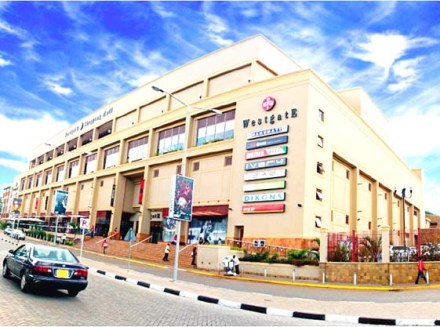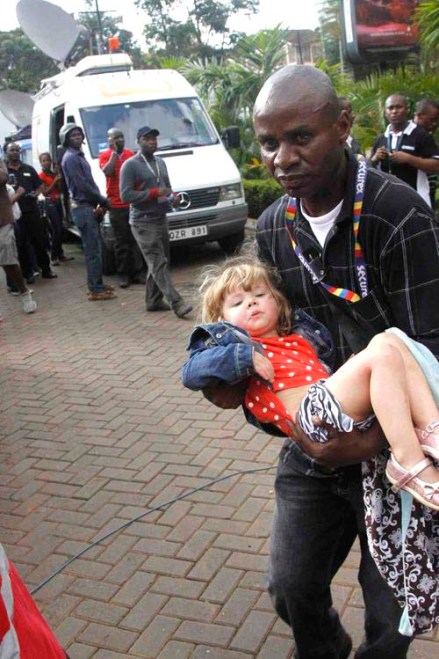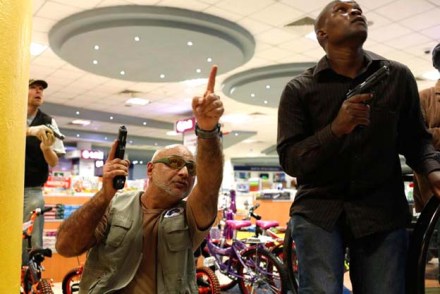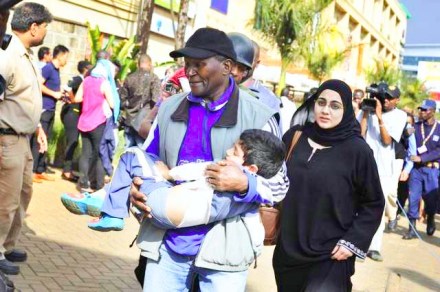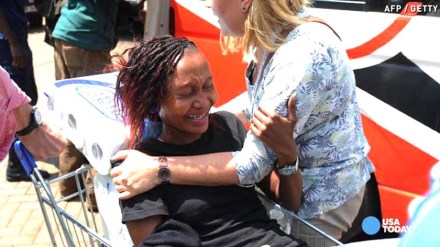WHAT A MONTH OCTOBER was – great stories, tragedies galore, rumours, spy drama, Nobel Prizes dished out, Mo Ibrahim Foundation refusing yet again to dole out the African Leadership prize, name it.
So what should we we make of all the exciting – and for sure depressing – stuff? At one point, as I reflected on these events, my mind went to a tingly dark place, and came up with unholy thoughts, but gems too. I cannot keep the torment and the delights to myself, so here I shall share:
•South Sudan: The Kingdom Of Four-Wheel Drives
![This how you ride if you are a Big Man in South Sudan...or else you don't ride.]()
This how you ride if you are a Big Man in South Sudan…or else you don’t ride.
To begin with a fly on the wall and a bird from South Sudan both confirmed to me that that new African nation, South Sudan, is truly the Four-Wheel Drive Kingdom. Stand at any street in the capital Juba, and there will be more fuel-guzzling Toyota Land cruisers than you can throw a hat at.
But, I was told, in South Sudan, there are four-wheel drives and there are four-wheel drives. The massive UN compound in Juba has several Toyota Land cruisers that have been parked in a corner for sometime now, the fly and bird told me. Apparently bleeding-heart UN wanted to help South Sudan’s governors to get around more efficiently, as most of their states have no roads worth the name. So it decided to help out by buying them Land cruisers that would overcome the rough roads. The problem is that they bought your average Land cruiser Prado, not the top-end V8. The governors said “nyet”. End of story.
Sorry, did I mention that South Sudan is one the poorest countries in Africa?
•America, Iraq, Afghanistan: We Misunderstand War
Iraq, even by its own horrid standards, has witnessed some of the worst terrorist bomb attacks of recent years. The casualties have been shocking. So has Afghanistan.
![A car bomb in Baghdad that killed several people: Maybe this mess is what Iraq was really supposed to be after the war.]()
A car bomb in Baghdad that killed several people: Maybe this mess is what Iraq was really supposed to be after the war.
The violence in Iraq and Afghanistan, tend to be viewed mostly as failure for the USA that invaded both countries supposedly to get rid of a murderous dictator (Saddam Hussein in Iraq) and Medieval-minded Islamist terrorists (the Taliban in Afghanistan).
Of course it would be better, especially for the women and children (many men seem to get off on war, so we will not bother with them for now) of Afghanistan and Iraq if the US had turned the two into peaceful rich countries.
However, that presumes that the US, like most invading/conquering powers of our time, does actually mean it when they say they are going into a country to “stabilise” it. If you think hard about it, it doesn’t make sense. A stable and powerful Iraq or Afghanistan is likely to bounce back, make deadly weapons, and seek vengeance.
As things are today, it will take a while for Iraq put together a huge army or manufacture dangerous chemicals to gas the Iranians, as Saddam did during the war between the two countries.
Afghanistan too will remain a basket case for many years to come. Terrorists and some nasty characters might breed there, yes, but they will not be able to build a bomb to nuke their enemies. I suspect, then, that the real objective of the campaigns in Iraq and Afghanistan was to leave them a mess. Maybe George Bush and President Barack Obama have been extremely successful in Iraq and Afghanistan, after all.
•Africa’s Greatest Heroes Lie At The Bottom Of The Sea Near Italy
Within two weeks in early October a boat, then a ship, carrying loadful of Africans capsised off the Italian island of Lampedusa.
![Bodies of African migrants who drowned off Lampedusa: Their death was not exactly in vain.]()
Bodies of African migrants who drowned off Lampedusa: Their death was not exactly in vain.
The ship was carrying some 500 Eritrean and Somali migrants. When it went down, at least 300 people died. The boat was carrying around 250 migrants. When it capsized, 50 of them washed up dead.
The scenes were sad, and hard to watch on TV. Yes, these Africans are fleeing desperate conditions at home, and taking stupid risks to get to Europe.
But let us remember, they have been doing this for over 30 years, drowning or dehydrating out in the high seas in their numbers. The Europeans have built barbed wire fences, strewn their shores with deadly dogs, built sophisticated surveillance, but Africa’s boat people are not deterred. The next lot of Africans just get on a rickety vessel and row to their death or try and breach the electric wire fences.
When I thought of these brothers and sisters dispassionately, I was very proud of them. They show the kind of spirit our continent needs if we are ever to rule the word. They are brave, and do not easily flinch in the face of peril. That is what great explorers like Christopher Columbus and Marco Polo did. These Africans who die off Lampedusa are our modern-day Columbuses. They refuse to accept their grim lives at home, and take a chance on checking out what possibilities lie beyond the horizon.
I think the real history of the world, its most adventurous and innovative peoples, actually lies at the bottom of its oceans and seas. The warriors who died in great naval battles, many lie at the bottom of our seas. The treasures seized in expeditions, the booty of imperial adventure, the loot lost by notorious pirates, millions of skeletons of African slaves, all are there. So are thousands of world citizens and their possessions swept away to see by storms, hurricanes, and tsunamis.
The boat people are great African explorers and adventurers. Their deaths are not in vain. And they are contributing Africa’s record to the archives at the bottom of the mighty waters.
•The US Budget Shutdown: America Is The Best Teacher When It Is At Its Worst
![Glum-faced Obama and House Speaker John Boehner: The problem is that too few world leaders face the kind of hard time the US president does.]()
Glum-faced Obama and House Speaker John Boehner: The problem is that too few world leaders face the kind of hard time the US president does.
The extreme right wing Republicans, who hate President Barack Obama in a very African way (the irony of that is endless), and a bit of pig-headedness by the Democrats, caused a two-week shutdown of the US federal government after Congress failed to pass a law to fund its operations.
The world had America for breakfast, lunch, and dinner. It was no better than a Third World failed state; its politicians were idiots; and so on, the world said.
But I was really impressed that among the few things that didn’t close was the US Patent and Trademark office —hate or like it, America is the world’s most innovative nation. At least it had the sense not to shutter the goose that lays the golden eggs.
But I also think that no president in the world should have a free ride, or live with the corrupting knowledge that he or she will always get his or her way. In its madness and bitter partisanship, the US Congress reminded us that no modern leader should be an emperor.
The problem, then, was not that the US had a budget shutdown and that its Congress is small-minded and mean. Rather, that too few other Parliaments in the world are able to shut down their government’s operations, and that there is hardly a leader anywhere else in the world who gets as hard a time as Obama does.
•If You Want To Know The Future Of Journalism, Count Its Dead
![French photojournalist Gilles jacquier killed in Syria: You have to give it to western journalists, as foreign correspondents, they die for the story more than anyone else.]()
French photojournalist Gilles jacquier killed in Syria: You have to give it to western journalists, as foreign correspondents, they die for the story more than anyone else.
So the last couple of years have been terrible for journalism. They have been killed in their dozens in Syria; they were beaten and shot in Libya during that chaotic war against the eccentric dictator Muammar Gaddafi; they have died in high numbers in Iraq; some have taken bullets in Afghanistan; they have been beaten and molested in Egypt; and of course in Palestine (by Israelis troops mostly); the list goes on and on.
But I looked the list of the dead journalists, and a curious pattern emerged. Either Kremlin thugs or criminal overlords kill most Russian journalists at home. Nearly all African journalists who have died in the last few years were killed at home by their governments, party muscle men, rebels, or criminal gangs. Same story in Asia, with a few exceptions.
Over 95 percent journalists killed outside their homes in the line of duty have been either American, European, or the odd Japanese. That simple fact alone tells you that for a long time to come, what the world sees of international news will be coloured by western bias and perspectives.
Indeed, as Kenya’s former anti-corruption czar John Githongo and now civil society activist wrote in Nairobi The Star newspaper, when the Somali Al-Shabaab terrorist attacked Westgate mall in Nairobi on September and killed nearly 80 people and wounded close to 200, the Kenya media all but collapsed in sob and solidarity journalism. For the first two days, the really useful pieces of reporting came from Al Jazeera, New York Times, Mail Online (particularly), BBC, CNN, The Guardian, and Washington Post.
We can scream against western media all we want, but until we also accept to die in strange wars getting stories for cynical audiences in the numbers that they do, they will always own the hill.
•The Mo Ibrahim Africa Leadership Prize: The Prize That Keeps Giving To Itself
Then, along came that wonderful Sudan-born telecoms tycoon, Mo Ibrahim.
![Mo Ibrahim: He keeps returning his Prize money for African Leadership leadership home; a deficit of worthy winners.]()
Mo Ibrahim: He keeps returning his Prize money for African Leadership leadership home; a deficit of worthy winners.
For the fourth time in five years, his baby The Ibrahim Prize for Achievement in African Leadership – the world’s biggest individual prize – had no winner.
The award, established by Mo in 2007, carries a $5 million prize paid over 10 years and $200,000 annually for life from then on, with a further $200,000 per year available for 10 years for good causes backed by the winner.
The award goes to a democratically elected African leader who demonstrated exceptional leadership, served his or her mandated term and left office in the last three years.
In a continent with a deficit of such leaders in power in the first place, one can’t help but wonder where Mo expects his retiring democrats to come from. Of course, if there is no winner, Mo does not throw the prize money in the River Thames. He (or his foundation for that matter) keeps it.
The result, is that every time there is no prize given out, Mo is the winner. And now a new narrative has emerged. Every year we look hoping to find that yet again, the continent has not produced a prizewinner. That non-prize story seems to be sweeter. We don’t want a winner anymore. Mo has truly rigged this thing.
•IGAD-EAC Marriage: Proud Ethiopia Offers To Pay Bride Price As It Sees Fit
As the “17-out-of-54” (as columnist Muthoni Wanyeki of Kenya put it in the regional weekly The East African) African Big Men met in the Ethiopian capital Addis Ababa to do their anti-ICC dance on October 12, something really huge happened on the sidelines.
![Beta Dance Troupe Ethiopia: They have attitude those folks in Addis Ababa]()
Beta Dance Troupe Ethiopia: They have attitude those folks in Addis Ababa
The Foreign Affairs ministers of the Inter-Governmental Authority on Development (IGAD) and the East African Community (EAC) went and talked many things. Key among them was regional integration. Burundi (represented informally by the Minister of Justice), Ethiopia, Kenya, Rwanda, Somalia, South Sudan, Sudan, and Uganda were in the house.
Among other things, their carefully worded communiqué said that the ministers, “Welcomed the increasing trend of consultation and collaboration between member States of IGAD and the EAC on issues of common interest to the East Africa region and the African continent as a whole…
The meeting “mandated the Ministers of Foreign Affairs of IGAD and EAC to explore the possibility of merging these two Regional Economic Communities with a view to establish a bigger economic bloc to expedite the integration process and ensure greater economic development and prosperity to the peoples of the Eastern Africa region”.
Sudan applied to join the EAC. It was spurned. South Sudan asked in—it is being admitted slowly by stealth. Ethiopia has kind of been invited to join the EAC. Those who understand Addis Ababa’s body language, say it too has indicating that it wants a serious relationship with EAC. It is deeply involved with Kenya in doing joint infrastructure (and the have had a defence pact since 1964). It is hands-in-glove with Uganda and Burundi on Somalia against the Al-Shabaab militants.
But Ethiopia is a proud land. With a population of nearly 100 million, it is just 50 million shy of the EAC’s combined 150 million. Two years ago, it surpassed Kenya as the largest economy on Africa’s eastern coast.
Ethiopia considers itself the regional chieftain, and now we can see that it was never going to be “lower” itself to apply – like the two Sudans did – to join the EAC. That is now likely to happen through an IGA-EAC marriage. IGAD is Ethiopian-dominated and a tool for Addis Ababa’s regional geopolitical games. Ethiopia is set on coming into the “Eastern” (not East) African Community as the typical African groom, not the bride. I don’t think it will accept to negotiate the bride price.
•twitter:cobbo3
Filed under:
Aliens & Stars,
Heroes & Villains,
Politically Incorrect,
Rogue Stuff Tagged:
Addis Ababa,
Afghanistan,
African boat people,
African migrants,
Al Jazeera,
American and European media,
American invasion,
and Washington Post. IGAD-EAC marriage,
car bombs,
Christopher Columbus,
CNN,
columnist Muthoni Wanyeki,
dead journalists,
dictator Muammar Gaddafi,
East African Community,
Eritreans,
Ethiopia,
Ethiopia economy bigger than Kenya’s,
Iraq,
John Githongo,
Juba,
Lampedusa,
Mail Online BBC,
Marco Polo,
Nairobi,
New York Times,
Saddam Hussein,
South Sudan,
Syria,
The Guardian,
The Kingdom Of Four-Wheel Drives,
UN car gifts for governors,
US shutdown,
western media,
Westgate mall attack ![]()
![]()
![]()
![]()
![]()
![]()
![]()
![]()
 TIME for another Letter From A Friend. The last time I shared some thoughts from my friend MD in the Diaspora was in May. It is always fun discussing and arguing with MD…he is well read, and an extreme free thinker.
TIME for another Letter From A Friend. The last time I shared some thoughts from my friend MD in the Diaspora was in May. It is always fun discussing and arguing with MD…he is well read, and an extreme free thinker.





